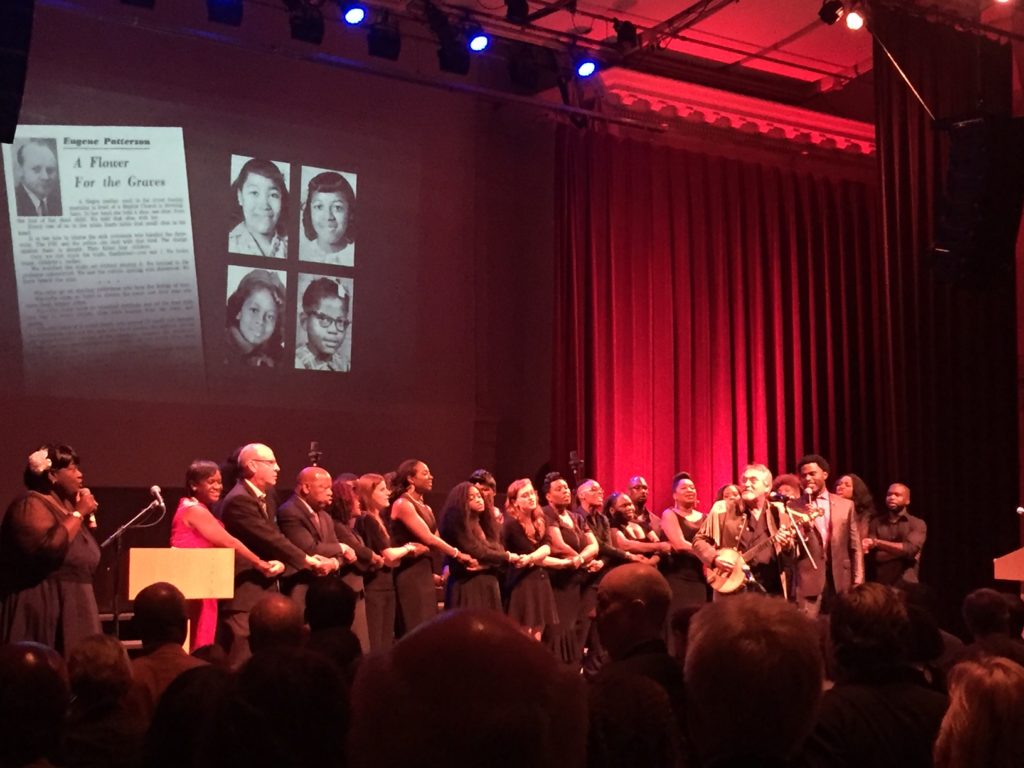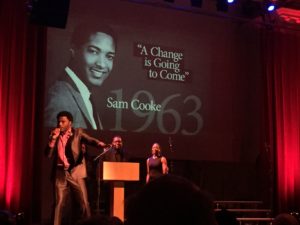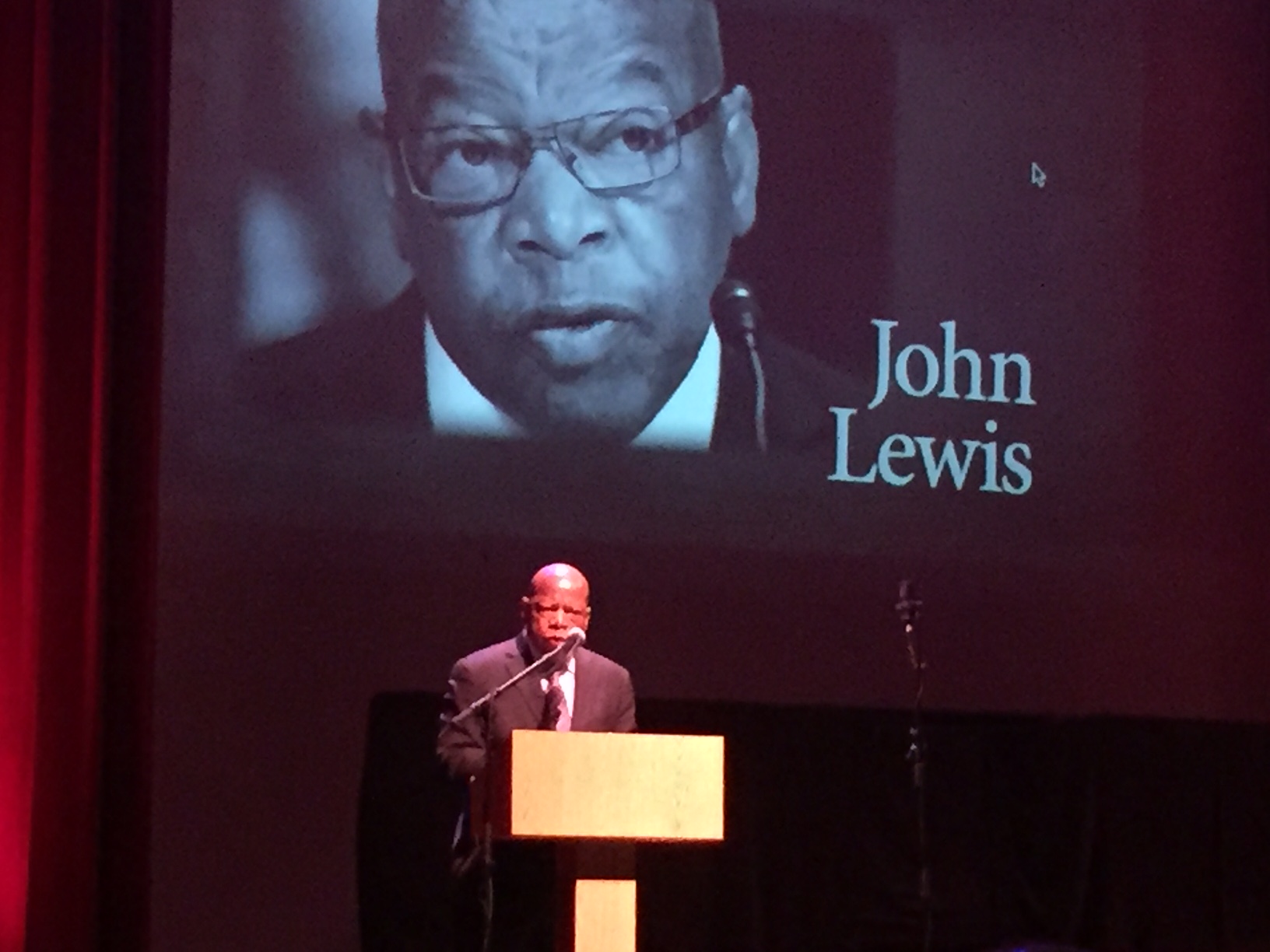Journalists get in the way.
They get in trouble and risk their security – sometimes their lives – to give a voice to the voiceless, shed light on important issues and hold the powerful accountable.
And on March 31 in St. Petersburg’s Palladium Theater, their bravery was recognized.
The event, hosted by the Poynter Institute for Media Studies, was part of a nationwide celebration honoring the 100-year anniversary of the Pulitzer Prizes. Awarded through Columbia University, the Pulitzer is widely considered the most notable and prestigious achievement in journalism and literary arts.
The night, which kicked off a two-day event that also included programs at Poynter and USFSP, paid tribute to scores of journalists throughout the years.
And not just any journalists.
No, the ceremony focused on a particularly brave group – a group that unleashed their pens and paper to support the civil rights movement and expose the era’s innumerable social injustices.
Community members along with Mayor Rick Kriseman and Pulitzer Prize-winning journalists from across the country took part in a commemoration filled with music and emotion.
Prominent journalists who made appearances include Leonard Pitts of the Miami Herald, Eugene Robinson of the Washington Post, Diana Sugg of the Baltimore Sun and Stephen Henderson of the Detroit Free Press. And that barely skims the surface.
The wizard behind the curtain? Roy Peter Clark.
Clark, who is Poynter’s vice president and senior scholar and a nationally famous writing coach, spent the last year organizing the nearly three-hour event.

At the end of the night, Rep. John Lewis, Roy Peter Clark and many others who brought the production to life, linked arms and sang ‘We Shall Overcome,’ a song that became a key anthem of the civil rights movement.
“This was a once-in-a-lifetime experience for me. The key was to bring together talented people from our community: journalists and artists devoted to social justice,” Clark said.
“At the end, I got to hold hands with Congressman John Lewis to sing ‘We Shall Overcome.’ What could be better than that?”
Speakers took turns reading excerpts from Pulitzer Prize-winning pieces rooted in social justice and equality. The timeline ranged from 1919 to 1994, with most falling between 1957 and 1969, the height of the civil rights movement.
As an aspiring journalist, to say the night was motivational would be a vast understatement. While I expected greatness, I had no idea what was coming.
I don’t think anyone did.
Lewis, D-Ga., a legendary civil rights leader, served as the keynote speaker. For me – and for many others, I’m sure – his words marked the first of the evening’s many goosebump moments.
In the days leading up to the celebration, Lewis spoke to the Tampa Bay Times about the dangers reporters faced when they documented the revolution 50 years ago.
“It was very dangerous to be a reporter,” he said. “If you had a pencil and a pad and if you had cameras, they would take the cameras and smash the cameras. And I saw reporters and photographers left lying in the street bleeding. And then they turned on us.”
At the beginning of his address, Lewis thanked reporters – something that made me overwhelmingly proud of the profession I’ve chosen, and also cry like a baby.
“I came here today to thank the people who get in the way, who get in trouble, necessary trouble,” he said.
But as Lewis spoke, he made sure to remind journalists to keep going and continue reporting courageously on issues of race and social justice.

Soul and R&B singer Alex Harris lit up the stage with his cover of Sam Cook’s 1963 single “A Change Is Gonna Come.”
“We must not sweep the issue of race under the rug, or put it in the corner; we need to face it head on,” Lewis said. “We need the press to be a headlight, not a taillight. You have a moral obligation to pick up your pens, your pencils … to use your cameras, to tell the story, to make it plain – to make it real.”
If that didn’t make every reporter in the room want to sprint out into the world and try to save everyone with their notepads, nothing ever will.
His speech set the tone for the rest of the evening. It was gut-wrenching and inspirational; it induced laughter and tears; it was frightening and incredible, all rolled into one.
On top of all that emotion, musical numbers and drama acts of the civil rights period exploded on the stage.
I could write for miles, but let’s just say the night yielded more than one standing ovation.
The night was arresting, but even more refreshing.
Not to moan and groan, but I don’t hear many positive remarks about journalism nowadays. While some criticism may be merited, it really does get discouraging, not to mention infuriating.
There will always be people from a group, a profession or even a country, who stray from the standards and values they once held, but ones their peers still hold.
Like race, no one has the right to make a blanket judgment based on singular examples – you know, the apparent “bad apples.”
It’s neither fair nor right to impose judgment on a group based on the color of their skin.
It’s neither fair nor right to impose judgment on a group based on the religion they practice.
And you know what?
It’s neither fair nor right to say that all journalists are sensationalists who bend the truth to advance an agenda or get a bigger headline.
It simply isn’t true.
And in the spirit of journalism, this event, this wonderful night, you know what it did?
It proved it.



